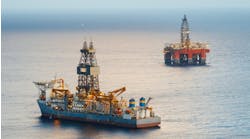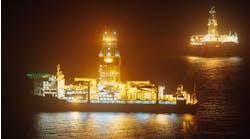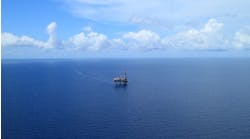Texaco's Block 9 in Angola's Kwanza Basin.
The lingering excitement over Angola's deepwater possibilities looks set to escalate with a fresh round of drilling successes being recorded in this part of the South Atlantic.
Barely a month after suspending Dalia-4, with such significant oil as to confirm the sheer size of the Dalia Field, Elf recorded another discovery in Tulipa-1. The well is in a stratigraphic configuration quite apart from any of those the company has drilled in the same Block 17. The well was drilled with Jim Cunningham and its proposed total depth was 8,250 ft.
There was no confirmation as to whether it was tested. BP Amoco's first well in deepwater Angola, Platina 1, in Block 18 has also been reported as successful, but no details have been released. Meanwhile in Block 15 the semisubmersible rig, Ocean Valiant, moved from Dikanza-2, where Exxon successfully appraised the Dikanza-1 discovery, and spudded Xikomba-1 on April 23.
Texaco's proposed well perks interest
Texaco's plan to spud a well next year in deepwater Block 9 in Angola 's second major basin, Kwanza, is being watched with keen interest. A technical evaluation of the area is now underway. The lease is located between the shore and water depths exceeding 1,000 meters. Texaco's concession lies in the deepwater part.
The deeper waters of Kwanza have not been an active site of exploration. Most of the five wells in Texaco's Block 9, the shallowest of the deepwater extent of the basin, have only small accumulations. These wells were drilled with the benefit of 2,040 km of 2D data, which was acquired by the previous holder Cities/Marathon, which also drilled all the five wells (all wildcats) between May 1981 and December 1985.
The technical evaluation includes reprocessing the existing 2D data, as well as acquiring and interpreting 1,100 km of new data. Texaco will not risk a well without acquiring and interpreting 3D data on the lease.
The company was named operator of the block in 1992. Negotiations were suspended as a result of outbreak of war. Texaco re-opened negotiations in 1994, and signed a production sharing contract in late 1998. The partners for the 4,937-sq km block include Mobil (35%), Energy Africa (15%), and Norsk Hydro (10%).
BP Amoco to drill Zambezi in 2000
Three years after it was first proclaimed as a major prospect, the Zambezi play in Mozambique will be finally tested next year by BP Amoco. The prospect is a combination structural stratigraphic play, one of the prospects that has kept BP's hope alive in West Africa, even as the company prepares to disinvest in oil giant Nigeria. BP announced in early May 1999 that it has "outlined plans" for its first well in the Zambezi offshore block.
"The $15-million well will be drilled next year," a company spokesman said. This report comes 18 months after BP first showed the Zambezi play to the public as highly ranked. The company has come up with exploration model that is likely to prove oil in the Zambesi. The spokesman added, to a roomful of industry managers: "In the next two years, BP will test the model in detail."
Gabon group forms teams for ultra-deepwater
At the recent Offshore West Africa Conference (OWA '99) in Abidjan, Cote d'Ivoire, John Ryckbourst of Vanco Energy gave a detailed discussion of the Vanco Gabon Group's activity in its deepwater concessions. The partnership was granted the Anton and Astrid Marin permits off Gabon last year, marking the first company to sign on for ultra-deepwater acreage off West Africa. In order to mitigate costs and reduce risks, the Vanco Gabon Group was formed with Total (28% - operator), Unocal (25%), Vanco (22%), Kerr McGee (14%), and R&B Falcon (11%).
Ryckbourst said teams have been formed within the group to undergo a staged development of the prospects. The companies have committed to drill four wells by November 2000 and are working now on a drilling design for ultra-deepwater. The R&B Falcon-Conoco Deepwater Frontier ultra-deepwater drillship will be used for the project, once the vessel's drilling campaign off New Zealand is complete.;
Chevron upbeat on WAGP, Nigeria
In a recent press briefing at the Corporate Council on Africa's "Attracting Capital to Africa" Summit in Houston, Chevron reported that the feasibility study for the West African Gas Pipeline Project (WAGP) has been completed. Chris Miller, head of the project for Chevron, stated: "We answered the question 'was the project commercially viable?' We see that there are no roadblocks and the next step is to form the consortium and get the project concession agreement signed between the consortium and the four governments. With diligence, we can get the project moving by 2002.
"The project also will add much to the reduction of flaring in the Western Delta of Nigeria. Currently about 300 MMcf/d of gas is being flared in the area. We already have captured 120 MMcf/d of gas. The project will capture even more. The West African Gas Pipeline project is a win-win-win situation. With this project Chevron wins, Nigeria wins, and the environment wins."
The project is expected initially to transport 100-150 MMcf/d of gas to locations in Ghana, Benin, and Togo. Ghana's neighbor, Côte d'Ivoire, also has reportedly signed agreements to deliver gas to Ghana. "Ivoirian gas is a competitor for the project," Miller said, "but the country does not have the reserves for a 20-year contract life. It looks more like five years. The gas market of Ghana cannot be enabled without adequate reserves."
When asked about the new political climate in Nigeria with the election of the new president, Dave O'Reilly, Vice Chairman for Chevron Overseas Petroleum, who was also in attendance at the briefing said, "It is a tremendous milestone for Nigeria. We have a great hope that things will happen and happen very timely. The President-elect had a meeting with several oil companies and everything he has said appears to be very good."
When asked about the problems in the Niger Delta, O'Reilly said that the industry needs to shift focus in the area. "Industry has been pushing to improve things in the Niger Delta. The people of the Delta want to be stake-holders and receive the benefit of the oil industry. We must find a way to develop the Niger Delta in a greater scope. We must look at the whole area, not just the communities around the fields."


